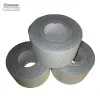What is cold applied tape?
Cold-applied tape, also known as cold-applied bitumen tape or cold-applied bituminous tape, is a type of adhesive tape used for corrosion protection and waterproofing of pipelines, particularly in the oil and gas industry. It is designed to provide a durable and protective coating for steel pipelines, joints, and other surfaces that may be susceptible to corrosion or environmental damage.
Here are some key features and aspects of cold-applied Wrapping tape:
1. Composition: Cold-applied tape is typically made of a bituminous or asphalt-based compound. This compound is often reinforced with materials like polyester or fiberglass to enhance its strength and durability. The tape may also have a protective outer layer to resist UV radiation and environmental elements.
2. Application Process: Unlike hot-applied tapes that require heat for activation, cold-applied tapes are designed to be applied at ambient temperatures. This makes them more convenient for field applications without the need for special equipment like heat induction machines. The tapes usually come in rolls, and the application involves unwinding the tape and wrapping it around the pipeline or joint.
3. Corrosion Protection: One of the primary purposes of cold-applied tape is to provide corrosion protection for steel pipelines. The bituminous compound creates a barrier that shields the metal surface from moisture, chemicals, and other corrosive elements, helping to extend the life of the pipeline.

4. Waterproofing: The tape also serves as a waterproofing material, preventing the penetration of water into the pipeline or joint. This is crucial for maintaining the integrity of the pipeline and preventing potential issues related to water damage.
5. Flexibility and Conformability: Cold-applied tapes are known for their flexibility and conformability to irregular shapes and contours. This makes them suitable for use on pipelines with varying diameters and complex geometries. The ability to conform to the surface helps ensure a tight and uniform seal.
6. Field Repair and Maintenance: Cold-applied tapes are often used for field repairs and maintenance of pipelines. They provide a quick and efficient solution for addressing minor damage or corrosion without the need for extensive downtime or specialized equipment.
7. UV Resistance: Some cold-applied tapes come with UV-resistant outer layers, providing additional protection against the harmful effects of ultraviolet radiation from the sun. This feature is particularly important for pipelines that are exposed to outdoor conditions.
8. Cost-Effective Solution: Cold-applied coating tapes are generally considered a cost-effective corrosion protection solution compared to certain alternatives. Their ease of application, versatility, and effectiveness make them a popular choice in various industries.
In summary, cold-applied tape is a versatile and convenient solution for corrosion protection and waterproofing in pipeline applications. Its ability to be applied at ambient temperatures, flexibility, and cost-effectiveness make it a preferred choice for many infrastructure projects.


